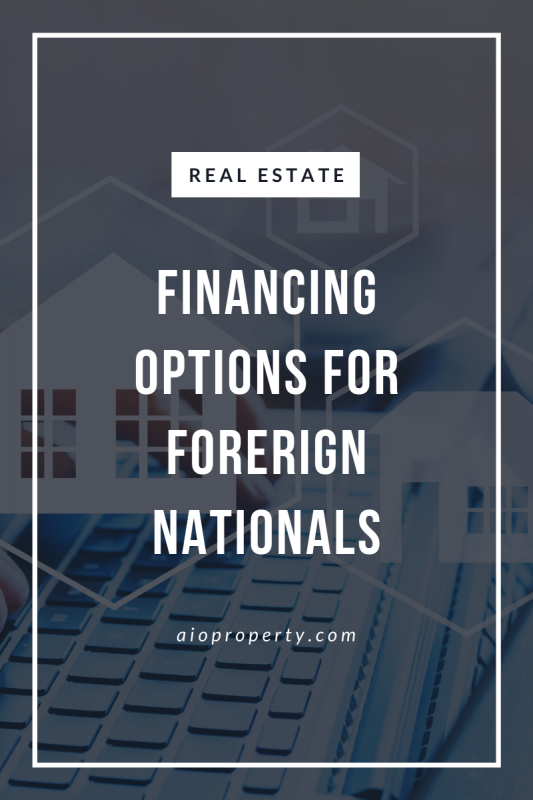
While purchasing a home in the U.S. is challenging for just about everyone, research shows that many lenders are willing to extend credit to foreign nationals. This includes those foreign nationals without a credit history in the United States. In fact, foreign nationals can even qualify for government-insured mortgages, which typically require a lower down payment.
According to the research, foreign nationals are actually more likely to purchase a home using a mortgage. Notably, the National Association of Realtors ® (NAR) reported that foreign nationals purchased 266,754 homes on American soil between April 2017 to March 2018. Similarly, in their “Profile of International Activity in U.S. Residential Real Estate,” published in 2019, NAR reported that 67% of resident foreign buyers acquired mortgage financing from U.S. sources.
Below we discussed what you need to qualify for a home loan in the United States if you are a foreign national.
Residency Status
The primary factor for getting approved for home mortgage financing is one’s residency status. However, the U.S. mortgage industry’s definition of foreign national is narrower than the definition used for immigration purposes. For U.S. mortgage purposes, you are either,
A Foreign national – a person whose primary residence is not in the U.S. but who visits the U.S. for brief periods for business or vacations.; or
A Permanent resident – a person with a green card (i.e., Form I-551); or
A Non-permanent resident – a person who holds a valid work visa (i.e., E1, E2, H1B, H2A, H2B, H3, L1, and G1-G4)
Minimum Requirements
Usually, it’s easier to get approved for mortgage financing if you are either a permanent resident or a non-permanent resident because Fannie Mae and Freddie Mac (United States government-sponsored enterprises that purchase the majority of home loans on the secondary market) essentially have the same guidelines for a green card and work visa holders as U.S. citizens. The lender just has to verify the applicant’s legal residency.
However, keep in mind that foreign nationals or those who do not have a primary residence in the U.S. do not comply with Fannie Mae or Freddie Mac’s standards. As such, lenders will have to keep these loans on their books if they decide to loan to foreign nationals. Since the bank assumes more risk by keeping these loans on their financial books, the bank will typically require down payments of at least 20% up to 50%.
In any event, keep in mind that the minimum requirements for foreign national loans have changed in the past couple of years as more non-bank and wholesale lenders enter the U.S. mortgage market. That means that lenders are offering more competitive rates and terms than what was offered in the past, which is great for non-U.S. citizens.
Documentation Required
When U.S. citizens apply for mortgage financing, the process is fairly straightforward since most U.S. citizens have some type of credit rating in the United States. Additionally, their W-2 forms and tax returns will also provide documentation of their financial income over the last couple of years. However, for non-US citizens, this process can be tricky, especially if they have not been in the U.S. for that long. Particularly if you have not been in the country, you may not have credit reports from the three major credit bureaus: Experian, Equifax, and Transunion.
You can distinguish yourself from other applicants if you have an existing relationship with an international bank with branches within the United States. Particularly if your financial records are available, they may be willing to offer mortgage financing to you, even without a credit report from the three major U.S. bureaus. Fortunately, for non-US citizens, the mortgage industry is dominated by large international banks, so there’s a chance you may have had a banking relationship with one of them in the past.
Depending on the lender, they may also be willing to order international credit reports in place of a credit report from the three major U.S. credit bureaus. However, this process is pretty expensive.
If you are a non-U.S. citizen that doesn’t have a long work history in the U.S, the FHA will accept non-U.S. tax returns as proof of employment, which is beneficial.
FHA Loans
The Federal Housing Administration (FHA) has fairly low credit score requirements and requires a down payment as low as 3.5%. The FHA offers the same loan terms as other buyers, as long as the borrower can provide proof of permanent residency in the U.S.
One thing to keep in mind is that if you are looking to get approved for an FHA mortgage, you must be planning to use your home as a primary residence and provide a valid social security number together with Employment Authorization Documents.
In other words, the FHA does not extend mortgages to non-residents who do not plan to use their homes as their primary residency.
Picking a Lender
Some lending institutions will make borrowers go through more hurdles than others to get a loan, so you can eliminate some stress by identifying ones that frequently deal with non-U.S. citizens. That’s most likely the place to begin if you’ve done any type of business with a global bank that has branches in the U.S.
Additionally, credit unions are another option. These nonprofit financial lenders tend to provide exceptionally competitive rates and, depending upon their area, may have special financing programs for green card and visa holders.
Alternative lenders with more aggressive foreign national lending terms are providing innovative programs, making financing a home purchase in the U.S. easier.
In any event, keep in mind that you may have to rely solely on a foreign national mortgage if you don’t have a social security number, no U.S. credit score or history, no verifiable income in the U.S., and/or have no way to verify your down payment.
The Bottom Line
Many domestic and international banks and mortgage companies offer both FHA home loans and conventional loans to non-U.S. citizens. Some lenders work exclusively or extensively with foreign nationals, and they tend to be more flexible with their documentation requirements, provided that the borrower can verify their residency status, work history, and financial track record
Non-U.S. citizens and foreign nationals can certainly own a home in the U.S. However, it requires a little more work and diligence to get approved. Working with an experienced real estate agent and mortgage broker could help move this process along faster.
A non-U.S. citizen’s residency status will be a major factor in obtaining approval.
Generally speaking, permanent residents who have a green card and non-permanent residents with a valid work visa typically have an easier time getting approved for financing compared with foreign nationals.
The FHA offers home loans to non-U.S. citizens with the same loan terms as it does U.S. Citizens. However, the home must be the applicant’s primary residency.
It is best to establish relationships with banks with a U.S. presence to build up an American credit report history before applying for mortgage financing as a non-U.S. citizen.
Higher down payments will typically be required if you are a foreign national. Expect to make a down payment of at least 20% up to 50%, depending on the strength of your financial documents.
Want to further discuss financing options for foreign nationals? Feel free to contact us! We’d love to chat with you.
